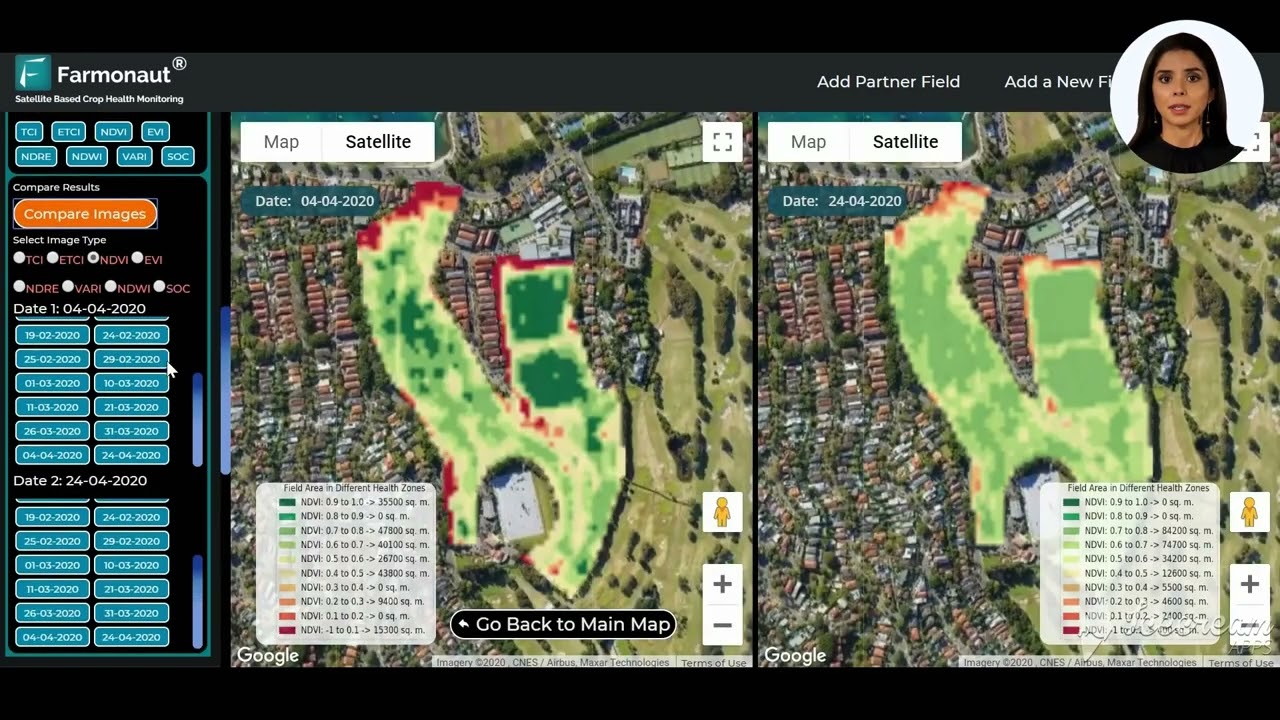Florida’s Citrus Industry Transformation: Adapting to Climate Challenges and Agricultural Shifts
“Florida’s citrus production has declined by over 70% in the past two decades due to citrus greening disease.”
Welcome to our comprehensive exploration of the Florida citrus industry’s transformation. In this blog post, we’ll delve into the unprecedented challenges facing citrus growers in the Sunshine State and how they’re adapting to climate challenges and agricultural shifts. As experts in remote sensing and GIS technology, we at Farmonaut are uniquely positioned to provide valuable insights into these changes and how technology can support farmers through this transition.

The Decline of Florida’s Citrus Empire
Once the crown jewel of Florida’s agricultural sector, the citrus industry is facing a crisis of unprecedented proportions. The combination of citrus greening disease and hurricane damage has dealt a severe blow to citrus production across the state. To understand the magnitude of this decline, let’s look at some startling statistics:
- In the 1997-1998 season, Florida produced a record 244 million boxes of oranges.
- The forecast for the 2023-2024 season is a mere 12 million boxes – a staggering 95% decrease.
- Over the past decade, citrus production has declined by approximately 73%.
This dramatic downturn has forced major growers to reassess their operations and adapt to the changing landscape. One such company, Alico Inc., based in Fort Myers, Florida, recently announced a significant shift in its business strategy.
Alico Inc.: A Case Study in Adaptation
Alico’s decision to wind down its citrus operations marks a critical turning point for the Florida citrus industry. The company cited the relentless challenges posed by citrus greening disease and the devastating impact of hurricanes as the primary reasons for this strategic shift. Let’s break down the key points of Alico’s announcement:
- Cessation of further investments in citrus after the current crop is harvested
- Workforce reduction affecting up to 172 employees
- Plans to maintain about 75% of its agricultural ties while seeking new opportunities for development
- Targeting around 10% of their land for commercial and residential projects within the next five years
This move by Alico is not an isolated incident but rather a reflection of the broader challenges faced by the entire Florida citrus industry. It underscores the need for adaptation and diversification in the face of environmental and economic pressures.
The Impact of Citrus Greening Disease
Citrus greening disease, also known as Huanglongbing (HLB), has been the primary culprit behind the decline of Florida’s citrus industry. This bacterial disease, spread by the Asian citrus psyllid, has devastated citrus groves across the state. Here’s what you need to know about citrus greening:
- Symptoms include yellowing of leaves, stunted growth, and bitter, misshapen fruit
- Once infected, trees typically die within 3-5 years
- There is currently no cure for the disease
- Management strategies focus on controlling the psyllid population and removing infected trees
The widespread nature of citrus greening has made it increasingly difficult for growers to maintain viable operations. This has led to a search for alternative crops and farming practices that can withstand the challenges posed by this devastating disease.
Hurricane Damage: Adding Insult to Injury
As if citrus greening wasn’t enough, Florida’s citrus industry has also had to contend with the destructive force of hurricanes. Recent storms, including Hurricanes Irma, Ian, and Milton, have caused significant damage to citrus groves across the state. The impact of these storms includes:
- Uprooted trees
- Flooding of groves
- Loss of fruit
- Damage to irrigation systems and other infrastructure
The combination of citrus greening and hurricane damage has created a perfect storm of challenges for Florida’s citrus growers. This has accelerated the need for adaptation and diversification within the industry.
Diversification: The Key to Survival
“Major Florida growers are diversifying up to 50% of their agricultural land to crops other than citrus.”
In response to the challenges facing the citrus industry, many growers are turning to diversification as a survival strategy. This involves exploring alternative crops and land uses that can provide more stable and sustainable income streams. Some of the popular alternatives include:
- Blueberries
- Peaches
- Avocados
- Hemp
- Agritourism ventures
By diversifying their operations, growers can spread their risk and reduce their dependence on a single crop. This strategy not only helps to mitigate the impact of citrus greening and hurricane damage but also opens up new market opportunities.
Sustainable Agricultural Practices and Crop Resilience
As Florida’s agricultural landscape evolves, there’s an increasing focus on sustainable practices and crop resilience. This shift is not just about surviving in the face of current challenges, but also about preparing for future climate-related issues. Some of the key areas of focus include:
- Water conservation techniques
- Integrated pest management
- Soil health improvement
- Use of disease-resistant varieties
- Precision agriculture technologies
At Farmonaut, we’re at the forefront of this agricultural transformation, offering cutting-edge solutions to help farmers adapt to these changes. Our satellite-based farm management solutions provide real-time insights into crop health, soil moisture levels, and other critical metrics. This data-driven approach enables farmers to make informed decisions about irrigation, fertilizer usage, and pest management, ultimately optimizing crop yields and reducing resource wastage.
To learn more about how our technology can support your farming operations, check out our web app or download our mobile apps:
Economic Implications of Agricultural Shifts
The transformation of Florida’s citrus industry has far-reaching economic implications. These changes affect not only the growers themselves but also the broader agricultural workforce and local economies. Some of the key economic impacts include:
- Job losses in traditional citrus operations
- Shifts in land values and property taxes
- Changes in supply chain dynamics
- Emergence of new agricultural sectors
While these changes present challenges, they also offer opportunities for innovation and growth in Florida’s agricultural sector. By embracing new technologies and diversified farming practices, the state can position itself for a more resilient and sustainable agricultural future.
The Role of Technology in Agricultural Transformation
As the Florida citrus industry undergoes this significant transformation, technology plays a crucial role in supporting farmers and guiding decision-making processes. At Farmonaut, we’re committed to making precision agriculture affordable and accessible to farmers worldwide. Our platform offers several key features that can assist Florida growers in navigating these changes:
- Real-time crop health monitoring using satellite imagery
- AI-based advisory systems for personalized farm management
- Blockchain-based traceability solutions for supply chain transparency
- Resource management tools for optimizing operations
By leveraging these technologies, farmers can make data-driven decisions, improve efficiency, and adapt more effectively to changing environmental conditions. For more information on our API services, visit our API page or check out our API Developer Docs.
Florida Citrus Industry Transformation Metrics
| Metric | Pre-2000 | Current (2023) |
|---|---|---|
| Annual citrus production (in million boxes) | 244 | 12 |
| Number of active citrus groves | 7,500 | 2,500 |
| Citrus acreage | 850,000 | 375,000 |
| Percentage of groves affected by citrus greening | 0% | 90% |
| Average annual hurricane damage to citrus crops (in million USD) | 50 | 200 |
| Workforce employed in citrus industry | 80,000 | 30,000 |
| Percentage of land repurposed for alternative crops | 5% | 30% |
| Number of citrus varieties cultivated | 10 | 15 |
| Adoption rate of precision agriculture techniques (%) | 10% | 60% |
| Investment in disease-resistant citrus research (in million USD) | 5 | 50 |
Looking to the Future: Opportunities and Challenges
As we look to the future of Florida’s agricultural sector, it’s clear that both opportunities and challenges lie ahead. The transformation of the citrus industry, while difficult, has opened up new avenues for innovation and growth. Some key areas to watch include:
- Development of disease-resistant citrus varieties
- Expansion of alternative crop industries
- Adoption of climate-smart agricultural practices
- Integration of advanced technologies in farming operations
- Evolving consumer preferences and market demands
By staying adaptable and embracing new technologies and practices, Florida’s agricultural sector can emerge stronger and more resilient from this period of transformation.
Conclusion: Embracing Change for a Sustainable Future
The transformation of Florida’s citrus industry is a testament to the resilience and adaptability of the state’s agricultural sector. While the challenges posed by citrus greening disease and hurricane damage have been significant, they have also spurred innovation and diversification. As we move forward, it’s clear that technology, sustainable practices, and a willingness to adapt will be key to the industry’s survival and growth.
At Farmonaut, we’re committed to supporting farmers through this transition with our advanced satellite-based farm management solutions. By providing real-time data and insights, we empower farmers to make informed decisions and optimize their operations for the challenges of today and tomorrow.
To learn more about how Farmonaut can support your agricultural operations, explore our subscription options below:
FAQs
Q: What is citrus greening disease?
A: Citrus greening disease, also known as Huanglongbing (HLB), is a bacterial disease that affects citrus trees. It’s spread by the Asian citrus psyllid and causes yellowing of leaves, stunted growth, and bitter, misshapen fruit. Currently, there is no cure for the disease.
Q: How has hurricane damage affected Florida’s citrus industry?
A: Recent hurricanes, including Irma, Ian, and Milton, have caused significant damage to citrus groves across Florida. This damage includes uprooted trees, flooded groves, loss of fruit, and damage to irrigation systems and other infrastructure.
Q: What alternative crops are Florida citrus growers considering?
A: Some popular alternatives include blueberries, peaches, avocados, and hemp. Many growers are also exploring agritourism ventures as a way to diversify their income streams.
Q: How can technology help in the transformation of Florida’s agricultural sector?
A: Technology plays a crucial role in supporting farmers through this transition. Tools like satellite-based crop monitoring, AI-driven advisory systems, and precision agriculture techniques can help farmers make data-driven decisions, improve efficiency, and adapt to changing environmental conditions.
Q: What is the economic impact of the citrus industry’s decline on Florida?
A: The decline has led to job losses in traditional citrus operations, shifts in land values and property taxes, changes in supply chain dynamics, and the emergence of new agricultural sectors. However, it has also spurred innovation and diversification in the state’s agricultural industry.
As we conclude our exploration of Florida’s citrus industry transformation, it’s clear that while challenges abound, so do opportunities for innovation and growth. By embracing new technologies, sustainable practices, and diversified farming strategies, Florida’s agricultural sector can navigate these changes and emerge stronger. At Farmonaut, we’re proud to be part of this transformation, providing cutting-edge solutions to support farmers in this exciting new era of agriculture.



















